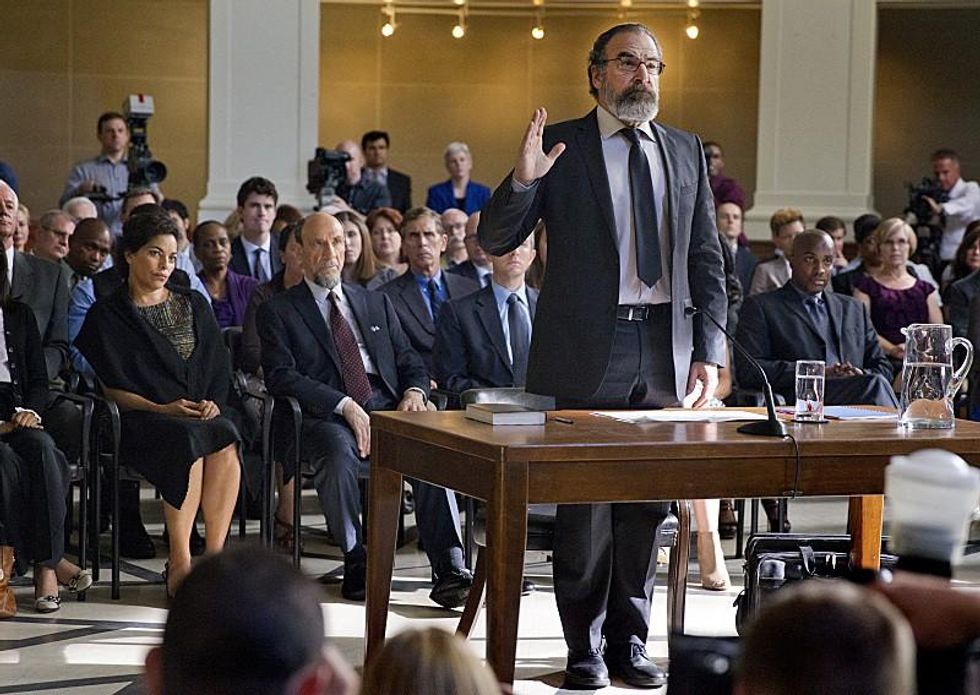Government agencies have a long history of influencing cultural representations and determining how the public understands the work of the national-security state. Way back in the 1930s, the FBI set up an office to shape and police its image in film, radio, and television shows. To date, FBI press officers seek to mystify the workings of the Bureau by encouraging fictional depictions that glorify its activities.
Other government agencies - the Department of Defense, the Army, the Navy, Air Force - followed the FBI's lead soon afterwards, and established media offices aimed at systematically winning media producers sympathetic portrayals. The CIA and the Department of Homeland Security have most recently joined the trend.
Often, these public relations campaigns on behalf of the national-security state involve indirect government funding of propagandizing films and television shows. In his analysis of the depiction of Arabs in Hollywood, media scholar Jack Shaheen noted a pattern of Arab-bashing films like True Lies, Executive Decision, and Freedom Strike receiving equipment, personnel, and technical assistance from the Department of Defense in the 1990s. In 2000, the Pentagon even spent $295,000 to host a star-studded dinner in honor of Motion Picture Association President Jack Valenti.
Pentagon spokesman Kenneth Bacon commented at the time, "If we can have television shows and movies that show the excitement and importance of military life, they can help generate a favorable atmosphere for recruiting."
The effort has paid off with the creation of a slew of films and television shows that whitewash the military and national security agencies, including recent films like Rules of Engagement and Argo, and the shows JAG and Covert Affairs.
The incentive for filmmakers and television producers is that, in exchange for handing over some editorial control, they are able to shoot on location, use government personnel as extras, avail of stock footage, use expensive equipment, and have access to technical consultants - without the costs appearing in the production budget. From the point of view of the corporate media, it is cheaper to go along with government influence than to hire their own submarines and air force carriers.
This leads to a system where film and television become arteries through which the national-security state circulates its latest obsessions. During his recent visit to the CIA, Homeland co-creator Alex Ganza asked for suggestions for locations of future story lines. The agency pointed him in the direction of North Africa, which happens to be the most recent focus of US counter-terrorism efforts.
But this has not just been a one-way relationship, in which the security establishment has determined cultural production. There is also a reverse effect, involving cinematic and television accounts of terrorism and counter-terrorism feeding back into the world of policy-making.
The 9/11 Commission report, released in 2004, famously identified a "failure of imagination" as the basic problem with US national security policy. "Imagination is not a gift usually associated with bureaucracies," noted the report's authors. Preventing terrorist attacks in the future would require finding "a way of routinizing, even bureaucratizing, the exercise of imagination." It was noted at the time that Tom Clancy's 1994 novel Debt of Honor had already imagined an airline pilot flying a Boeing 747 into the US Capitol during a joint session of Congress, yet intelligence agencies themselves had not anticipated this possibility.
In the War on Terror, it seemed, the erstwhile inability of security bureaucracies to imagine potential threat scenarios might be remedied by drawing on the creativity of Hollywood scriptwriters and right-wing pulp novelists. What was needed, it was thought, was to get inventive in conjuring up potential threats, as well as breaking down pre-existing assumptions of how best to prevent them. Hollywood became as significant as Arlington, Fort Meade, and Langley in the landscape of the US national-security state.
One early documented case of this reverse effect occurred with the Fox TV series 24. In effect, the show provided a weekly policy briefing to the nation on the myriad threats supposedly faced by the US and how best to counter them. Joel Surnow, the show's co-creator and executive producer, told journalist Jane Mayer, "America wants the war on terror fought by Jack Bauer. He's a patriot." Since Bauer's main tactic in the show is torture, the implication was clear.
In the fall of 2002, government lawyers responsible for authorizing new techniques of interrogation felt that the second season of 24, then being broadcast, gave them the green light to approve torture techniques that had previously been considered fundamentally immoral. The limits of acceptability had been collectively re-imagined, creating a new "common sense" of national security. The fact that a film like Zero Dark Thirty presents the use of torture as an acceptable topic of discussion rather than an absolute wrong is a good indication of how much the terror war has permanently shifted earlier ethical norms in the name of a Hollywood-infused "moral clarity" against terrorism.
Yet, the failure of the war in Iraq, the declining credibility of the United States on the global stage, and the backlash against George W. Bush's approach necessitated a shift. Enter Obama and the age of "smart power." The US national-security state now claims to be interested in winning "hearts and minds" as much as "shock and awe." Cultural knowledge, targeted strikes, and patient intelligence-gathering are supposed to be the new methods of the War on Terror, rather than blanket demonization, military occupations, and fabricated justifications for war.

 The show Homeland began its third season with
The show Homeland began its third season with 